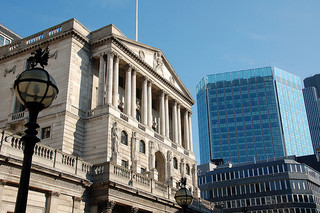It is often said central banks saved the world economy following the 2008 Global Financial Crisis. In reality, monetary policy has created an even larger bubble than that which burst in 2008. But the trend has now been going on for a generation – from the 1980s onwards, every recession […]
Read MorePost Tagged with: "Bank of England"
Keynes, Carney and the corruption of capitalism
We’ve come a long way since the Bank of England’s Andy Haldane pointed out that they had “intentionally blown the biggest government bond bubble in history” and that it constituted the biggest risk to financial stability. Yesterday, in his Sky News interview, the Bank’s Governor Mark Carney said that the housing […]
Read MoreHaldane: Bond bubble is the biggest threat to financial stability
Via City A.M., Bank official: Bond bubble is the biggest threat to financial stability | City A.M.. OUTSPOKEN Bank of England official Andrew Haldane warned yesterday that the bursting of a bond bubble is the biggest threat to the world’s financial stability. Haldane, the Bank’s executive director of financial stability, told […]
Read MoreThe madness of contemporary economists
The Bank of England is considering negative interest rates to “stimulate” the economy, together with more QE. It’s one thing to pay a bank for safe-keeping and other services, another for the central bank to manipulate the credit markets as a whole. It is explicitly a policy of expropriating savers, […]
Read MoreGood and bad economic news
Today, we learn, Europe’s leaders are poised this morning to cut the European Union’s budget for the first time in its 56 year history following a major victory for David Cameron. Great news and congratulations to the Prime Minister and the negotiating team. Let’s hope MEPs don’t block it. On […]
Read MoreIf the Treasury Committee rejects the new Governor, the House must have a binding say
I’m not excited about the appointment of a new Governor of the Bank of England. The money power is one too pervasive and too dreadful to be trusted to an individual or a committee: the prospects of tens of millions of people ought not to depend on the talents and […]
Read MoreA confession from the Governor?
In his Cardiff speech last night, Sir Mervyn King admitted the Bank of England’s short term policies “appear diametrically opposed to those needed in the long term.”Sir Mervyn still believes that ulta-low interest rates have prevented the recession becoming a depression. However he confessed that such low interest rates prevent bad investments from […]
Read MoreLeverage and the Bank of England
In his speech yesterday, potential Governor of the Bank of England Paul Tucker discussed moral hazard, agency problems, short-termism and the “manifestly false” assumptions of risk models. I almost feel prophetic. He also said: When credit markets become overly exuberant, not only do the balance sheets of lenders become stretched, […]
Read MoreThe drive to resume credit expansion and recent growth in private employment
Last night’s news coverage of the Bank of England’s prediction of no growth in 2012 was wearily predictable. There were calls for one last rate cut, more “monetary accommodation” and then turning to the Chancellor for more government spending. We can’t borrow and print our way to prosperity. That’s how […]
Read MoreFor The Spectator Coffee House – Why tolerate central banking?
“Did you encourage them to make up the made up thing to their own advantage?” That’s how one Twitter correspondent paraphrased a question to the Deputy Governor of the Bank. The LIBOR scandal has exposed the institutions and culture of the City to popular scrutiny as never before. The population […]
Read More
